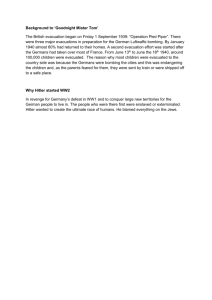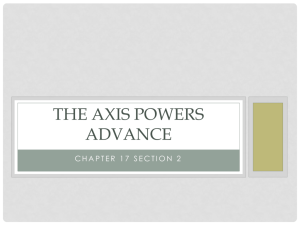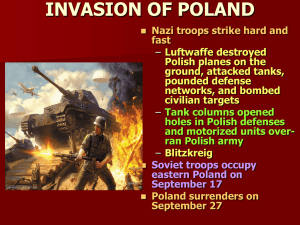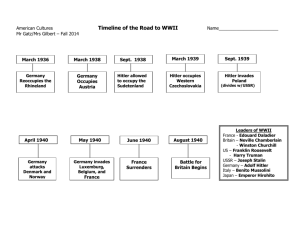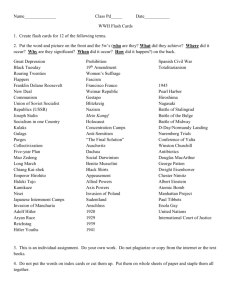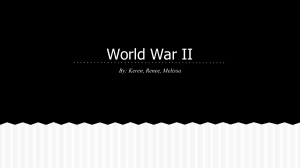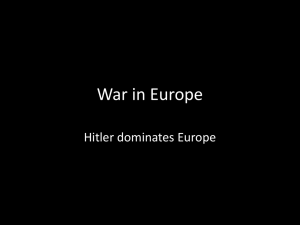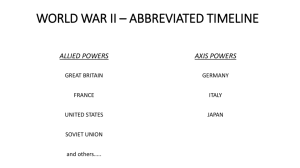File - Campbell's Web Soup
advertisement
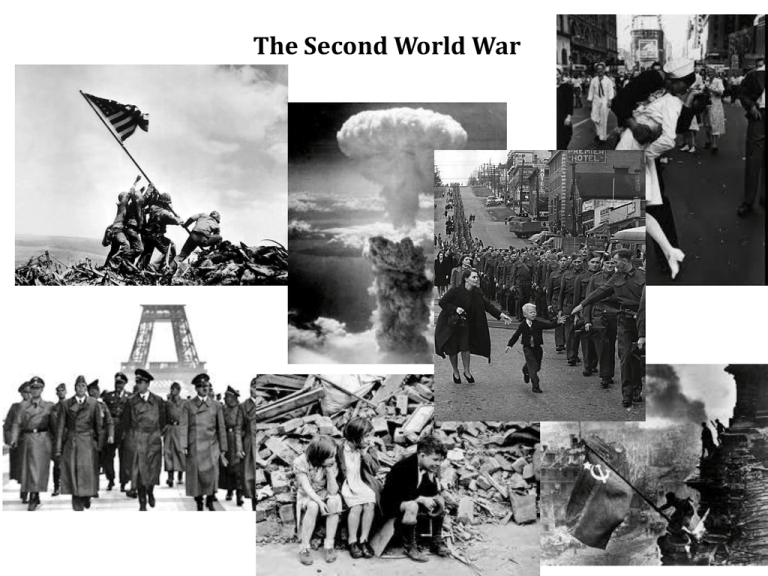
The Second World War Intro to the Second World War A series of wars which slowly engulfed the world… • • • • Japanese Invasion of Manchuria, 1931 Italian Invasion of Abyssinia, 1935 Spanish Civil War, 1936 Hitler’s aggression in Europe, 1936-1939 Different from the Great War of 1914-1918 • Technology • War of Motion • Ideology • Capitalist & Communist vs. Fascism • Two theatres of War • European (includes N. Africa, Atlantic) • Asia-Pacific • Crimes against Humanity "War is not merely a political act, but also a real political instrument, a continuation of political commerce, a carrying out of the same by other means.” On War, Karl Maria Clausewitz War in Europe 1 Sept 1939 – Invasion of Poland - Poland falls 10 September After fabricating a border dispute in the the free port of Danzig in the Polish Corridor, Hitler has the German ‘Wehrmacht’ (army) invade Poland Could Hitler win Poland by bluster and bluff, as he had won Czechoslovakia, or would his gamble lead to war? Britain & France pledge support to Poland Nazi-Soviet Non-Aggression Pact, Aug. ’39 Blitzkrieg (‘lightning war’) • Stuka bombers (Luftwaffe) • Panzers (tanks) • Speed, surprise of combined arms • Wireless radio How does blitzkrieg work and why was it effective? Heinz Guderian The ‘Phoney War’ – October 1939 to April 1940 • Wehrmacht finalizes invasion plans; troops massed along the Siegfried Line • British Expeditionary Force (BEF) on Belgium border • French armies waited behind Maginot Line • Winston Churchill • First Lord of the Admiralty • ‘Britain should take Norway’ Russo-Finnish War, Nov. ‘39-Mar. ’40 The Winter War • Soviets attack Finland in order to ‘safeguard’ its weak western border • Victory by Soviets comes at a surprisingly high loss of life • Reveals the true impact of Stalin’s Purges of Red Army during late 1930s End of the ‘Phoney War’ April 1940 • Hitler attacks Denmark, then Norway • Br. & Fr. rush an invasion force to Norway, but later forced to evacuate • Chamberlain resigns • Churchill becomes Prime Minister May 1940 • Wehrmacht blitzkriegs Holland, Belgium, Luxembourg, then France • Germans swarm into France through the supposedly impassable Ardennes Forest; Wehrmacht position drives a huge wedge between Br. & Fr. Forces • Allied forces retreat to Dunkirk What if? • Pinned down at Dunkirk, but Hitler orders a halt to Panzer divisions • Gave Goering and Luftwaffe job of completing victory • Delayed by poor weather Operation Dynamo (Miracle at Dunkirk) British Navy & hundreds of civilian craft rescue 330 000 Allied soldiers; significant loss of equipment however Fall of France • After Dunkirk, Wehrmacht pushes south into France with shocking speed • Paris declares itself a ‘free’ city rather than be destroyed by Hitler • Churchill contemplates a war without France 22 June 1940 – French government capitulates • Vichy government, led by WWI hero, Petain • ‘Free-French’ resistence movement, led by Charles DeGualle, established in England Britain Alone • Britain, the only democratic government left in Europe, faces great uncertainty… • Luftwaffe begins its fight for air superiority over British air space in preparation for the German naval invasion, known as Operation Sea Lion • German U-boats (in ’wolfpacks’) inflict huge losses on convoys of supply ships coming from Canada and the USA (Lend-Lease) Battle of Britain – Summer, 1940 Stages: • Luftwaffe bomb shipping in English Channel • Luftwaffe bomb RAF airfields & radar stations • Luftwaffe bomb ports and centers of industry **Errant bombs on London see Churchill retaliate’ sends RAF bombers on mission to Berlin (Aug. ’40) Goering enraged, so too was Hitler; strategic blunder Luftwaffe now begins ‘the Blitz’ – heavy bombing of city centres across England – London, Coventry • 40 000 civilians die during summer of 1940 Key Factors: • Radar Defense • Central Command • Spitfires & Hurricanes • International Pilots (RCAF too) Significance: Hitler denied a quick conquest Allies remain able to launch an advance War in the Mediterranean, 1941 Middle East • Oil • Suez Canal Feb. 1941 • Erwin Rommel (Desert Fox) & • Elite Afrika Corps land in Libya • Siege of Tobruk April 1941 • Hitler has concerns of southern flank • Wehrmacht invades Yugoslavia • Intimidate Hungary, Rumania, Bulgaria • Rescue Italians in Greece, later N. Africa • British withdraw to Egypt May 1941 • Wehrmacht paratroopers attack Crete • British break ‘Enigma’ Code • Heavy losses to Wehrmacht ‘Das Boot’ Battle of the Atlantic • Industrialism • N. America as ‘factory’ • ‘Arsenal for Democracy’ • Merchant Navy • Convoy System U-boats • wolfpacks German occupation of Norway and French seacoast, allows for much closer access to shipping lanes…. 1940-42 – • Britain two weeks from being starved • Long-range capabilities of U-boats • St. Lawrence Seaway • Eastern seaboard (USA) • Caribbean • ‘Black Pit’ (Mid-Atlantic) https://www.youtube.com/watch?v=ISD1hJz53L8 The Eastern Front, 1939-1941 Operation Barbarossa, June ‘41 • Two-Front War • Lebensraum • Despite initial success… the beginning of the end? • Blitzkrieg • 3 000 000 soldiers • Stalin’s purges had devastated and demoralized the Red Army • Scorched Earth Policy • Massive Casualties Three Pronged Attack – to Leningrad, Moscow, Ukraine – to Dec. ’41: Wehrmacht Victory? • Flaws: • Supply lines overstretched • Russian winter • Wehrmacht unable to engage the bulk of the Red Army in a decisive battle Turning Points in the European Theatre
